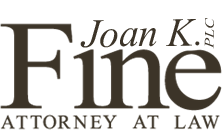The Purchase and Sale of a Business
After Ms. Fine received her J.D. degree, she became an associate at a Boston law firm and was trained through a mentorship program there. First sitting in on negotiations, then drafting documents, then doing a negotiation herself with a senior partner signaling her when to stop talking! It is this intense and rewarding experience she brings to her clients as a Winchester, Va., attorney. Ms. Fine works with business owners, their CPAs, insurance agents, and bankers, and begins by preparing a checklist to review with business owners. If a business owner is thinking about selling the business, the time for the business owner to look at the business’ profit and loss statements and list of assets is well before the business is listed for sale. The business’ CPA, together with a business planner, and attorney can make suggestions to improve the salability of the business.
Things to Consider When Buying or Selling a Business
- Does the business have assets subject to UCC financing statements that will have to be released at closing?
If yes, these need to be verified or released. - Does the business have a procedure to keep receivables current?
If not, the business should institute a policy or procedure for regular payment; sometimes a discount for payment within ten (10) days is a good idea. Systematically pursuing late payers helps to develop a pattern and an expectation that late payments will not be tolerated. - Does the business have a centralized customer list with all contact information and customer preferences?
If not, this should be developed because a customer list is one of the assets of a business being sold. The more comprehensive the customer list, the more value it represents. - Do the key business employees have employment contracts?
The purchaser will want to know what the terms of their employment are, whether they can be terminated and under what conditions, and whether their employment contracts contain non-competition clause and paragraphs to prevent them from joining a competitor. - Does the business have an insurance agent who handles all of the business’s insurance needs? Are there any potential liabilities?
The Contract of Purchase usually states that there are no known claims or liabilities against the business except as set forth in an attachment to the Contract. If there are potential claims or liabilities, some portion of the purchase price is usually retained in escrow to pay the claim or liability, or until it can be determined that the claim or liability will be covered by insurance or dismissed. IF the claim or liability is paid by the insurance or dismissed, the escrowed funds are released to the seller. - Does or will the business have a Buy-Sell Agreement or a Cross Purchase Agreement between or among the members/stockholders?
These can be funded by either key man life insurance or a promissory note.
The above are some of the issues a business should address. Planning for these issues usually causes greater satisfactory results for business owners.
